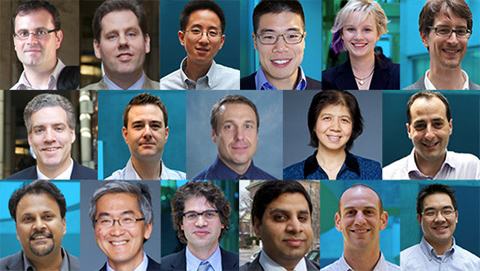
A boost of over $1.7-million worth of grants from the Canadian Foundation for Innovation (CFI) has been directed toward Engineering and will be used for infrastructure that will advance research in everything from testing drinking water to cancer. The funding comes from the CFI’s John R. Evans Leaders Fund, a program designed to help universities attract and retain the very best researchers.
Forty-four projects across the U of T have been awarded a total of $12.1 million, and of that, 17 are from Engineering.
“CFI’s support for research infrastructure will enable U of T Engineering – particularly our emerging research leaders in the Faculty – to continue to make breakthroughs that have global economic, societal and environmental impact,” said Ted Sargent (ECE), Vice Dean, Research.
One project being supported is led by Jeffrey Siegel (CivE). ‘Exploring the Secret Life of Indoor Air Particles’ investigates a little-known threat to human health – airborne microscopic particles.
According to Siegel there are between 100 and 10,000 microscopic particles in every cubic centimetre of air. “We can’t see them, but they’re all around us. We’re breathing them all the time. Even if we’re very conservative in our estimates, the average Canadian eats about seven kilograms of dust over a lifetime. And that’s just ingestion. We inhale a lot more.”
Indoor particles can be outdoor pollutants that migrated inside, or they can originate from indoor sources. Some particles are benign, but others cause serious long-term health problems ranging from heart disease to lung cancer.
On average, Canadians spend 90 per cent of their time indoors. Yet, “compared to what we know about outdoor particles, we know nothing about indoor ones,” Siegel said.
He is working to understand the physical, chemical and biological characteristics of indoor particles – they are all made up of chemicals that can be analyzed and microbes that can be identified using DNA sequencing. His CFI funding will go towards equipment that will allow him to study the physical characteristics of particles too. This is important because the size of a particle is directly related to how dangerous it is to human health.
He plans to conduct what he calls “filter forensics,” examining used filters from residential forced air heating and cooling systems. The CFI-funded equipment will allow him to extract filter dust, which can be invisible to the naked eye, and study it. The data collected can be combined with more easily generated chemical and biological data to make more realistic predictions about people’s long-term exposure to indoor particles.
For another recipient, Professor Stark Draper (ECE), CFI support will help transition his theoretical work on algorithms for digital communications into working technological models.
With the CFI’s support “my research team will be able to move our work in communication theory and algorithm design towards implementation significantly faster. We will use infrastructure provided by the CFI to shorten the journey from ideas to real-world applications,” he said.
The support will also help with the training of students who will have the opportunity to learn a mix of communication theory, algorithmic implementation and computer architecture. “These are areas that don’t typically mix in academia but which regularly come together in industry. CFI support will provide a unique academic training environment for our students.”
“Congratulations to all the winners,” said Professor Paul Young (CivE), U of T’s vice-president (research and innovation). “CFI funding has been essential to our ability to attract the world’s best researchers, and has, in turn, allowed those researchers to make progress on some of the most pressing problems of our time.”
For a list of U of T’s CFI-funded projects, please visit the U of T Research and Innovation website.
CFI grants to Engineering awarded to:
Jan Andrysek (IBBME, MIE)
Vaughn Betz (ECE)
Arthur Chan (ChemE)
Jennifer Drake (CivE)
Stark Draper (ECE)
Ron Hofmann (CivE)
Jonathan Kelly (UTIAS)
Yuri Lawryshyn (ChemE)
Antonio Liscidini (ECE)
Keryn Lian (MSE)
Prasanth Nair (UTIAS)
Jun Nogami (MSE)
Jeffrey Siegel (CivE)
Chandra Veer Singh (MSE)
Joshua Taylor (ECE)
Edmond Young (MIE)
Ding Yuan (ECE)




